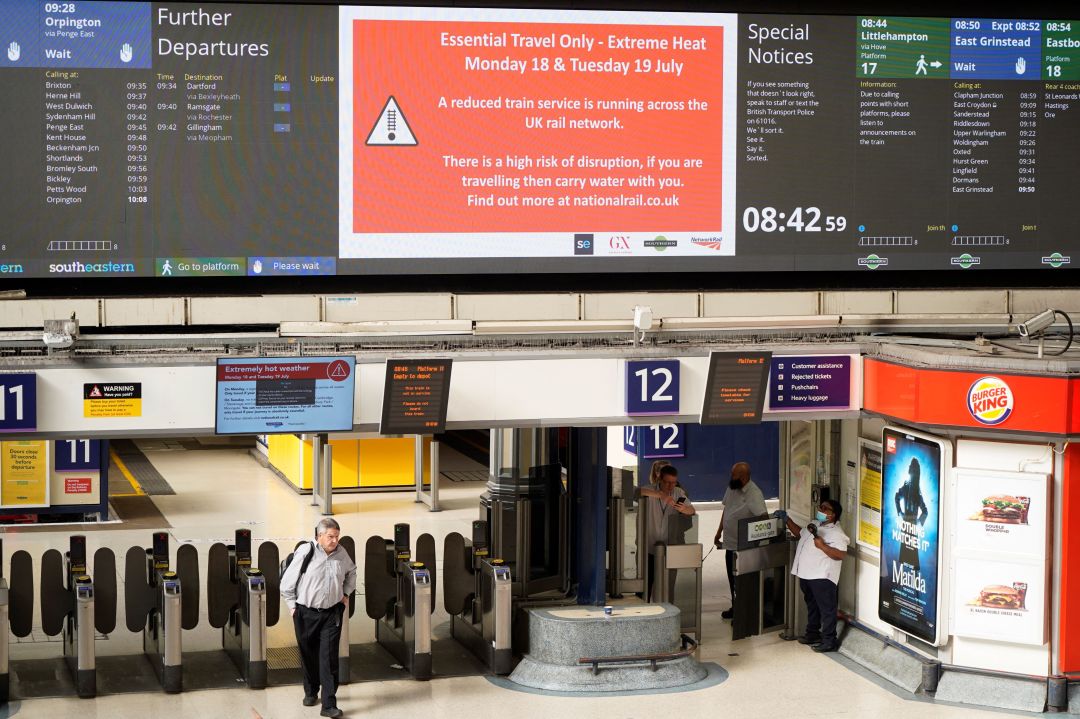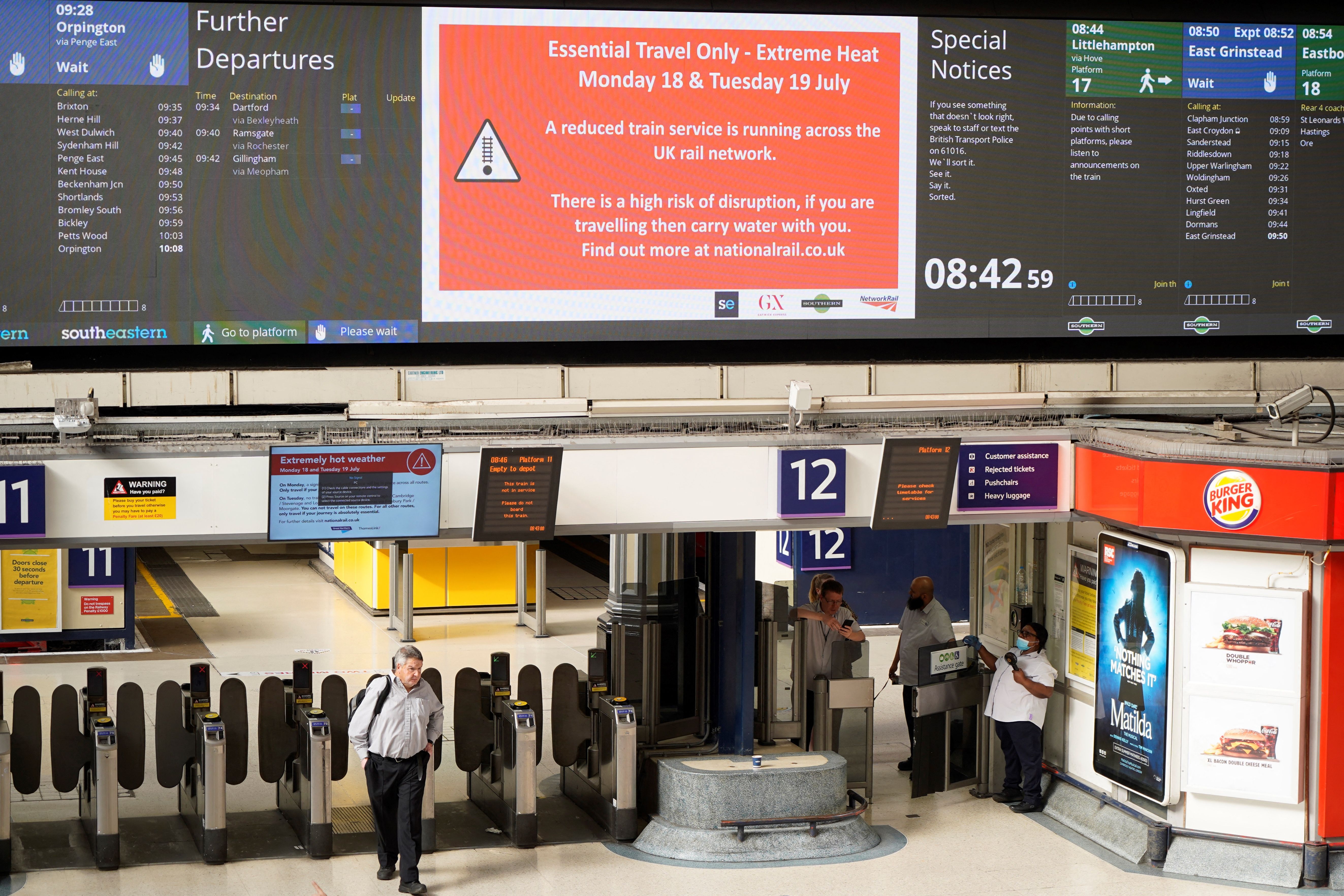Trains were running even more slowly than usual. Schools were closed again. Offices were empty. No one would deny that Monday and Tuesday were on the warm side, at least by British standards. Even so, there was something more alarming than the temperature: how quickly the authorities started to close down society – and showed that the lockdown instinct is still very much alive.
The Met Office, a body that has turned from fairly comical to slightly sinister in recent times, started advising everyone to stay at home. The unions asked for schools, offices and transport systems to be closed down. There were no trains north out of King’s Cross or Euston, and Luton airport closed completely. Sadiq Khan lost no time in asking people not to have barbecues. We didn’t quite get to the stage where the police were handing out on-the-spot fines to anyone more than five miles from their home, but it may only be a matter of time.
There is a theme running through the behaviour: that of the precautionary principle. It is an invention of recent times: translated from the expression Vorsorgeprinzip (‘foresight principle’), which was coined by German lawyers in the 1970s. Since the early 1990s it has become a stock phrase of public administrators around the world. It means that you don’t need to be sure about potential harm: even a small chance of it can justify taking action. So rather than running a basic cost-benefit analysis – asking if proposed measures are commensurate with risk – safety precautions are taken anyway.
There was something more alarming than the temperature
In the face of a threat that only affects a small group of people, help is not directed at those who need it but instead swaths of society are closed down and people advised not to travel. The wider costs are never calculated. What about the cost to education of denying children the right of classroom education? What about the cost to the economy of asking people not to go to work?
The one lesson we should surely have drawn from the pandemic is that we need to think a lot harder about the long-term consequences of being overly cautious. It is not as if we are not able to deal with the risks, or have been recklessly ignoring them. We may not have Dubai-style air-conditioning, but we do have more aircon systems in public places than ever before. To take just one example, four of the London Tube lines are cooled already, and more will be over the next two years. Commuters now routinely carry bottles of water, while anyone who is at particular risk from the heat can take extra care.
There will be fires now and again – they go along with heatwaves – but statistically, fires have never been rarer. There will be alarmists like Sadiq Khan claiming that it was ‘the busiest day for the fire service in London since the second world war’. But he won’t admit that fires in London have fallen two-thirds since the 1980s (let alone the 1940s) or that there were just 6,600 secondary (i.e. grass) fires last year, a record low and some 83 per cent below the 2003 peak. As for increased wildfires across the UK, satellite studies show no such trend in recent years. So why the panic?
Add it all up, and Britain is probably better prepared for heatwaves than at any other time in our history. Yet the inventiveness and resilience of society is not matched by the mood among public officials, who have never been quicker to panic. And regardless of the potential costs – the lost output, the cancelled hospital appointments – these officials immediately start spouting advice about staying at home.
The precautionary principle was first used to justify certain environmental policies by dispensing with the notion that costs should be proportional to risk. Now we end up with a net-zero target that no one has properly costed, and whose impact on global warming is also unquantified. If the Treasury is right in saying it would cost £60 billion a year, could the money be better spent in helping people adapt? Or, indeed, in doing more to address Britain’s perennial scandal of at least 20,000 ‘excess deaths’ every winter?
A Tory leadership contest offers the chance to break from old ways of thinking and seek more intelligent solutions to the conundrums presented by global warming. No one seriously questions climate change, nor the idea human activity plays a role. But Britain is leading the developed world in decarbonisation: our carbon emissions are lower than at any time since the invention of the motorcar. We have every right to question net-zero policies, and ask if the money earmarked for these will be well-spent.
What will happen next? Extreme gales? A bad flu season? We cannot live in a world where almost anything that might make life slightly uncomfortable is enough to trigger ‘work from home’ recommendations and the withdrawal of public services. Technological advances mean that we have never been better placed to cope with life’s challenges, whether they be climate change or pandemics. Public resilience and the human ability to adapt are as strong as ever. All we need now is a government that is capable of keeping calm and carrying on.







Comments